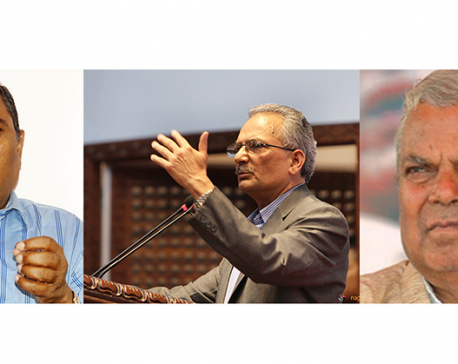
OR
#Editorial
Emphasize more than just prolonging stay in power
Published On: March 5, 2024 07:32 AM NPT By: Republica | @RepublicaNepal
_20230830114144.jpg)
Prime Minister Pushpa Kamal Dahal on Monday reshuffled his coalition partners and appointed three new ministers, marking a significant shift in the political landscape of Nepal. Breaking away from the Nepali Congress (NC), the largest party in the House of Representatives, Prime Minister Dahal has forged a new alliance with the CPN-UML, the second-largest in the lower house-- along with Rastriya Swatantra Party and Janata Samajbadi Party. While such political maneuvers are not uncommon, it is imperative to assess the implications of these changes and question whether they are truly for the betterment of the people and the country. Leaders from the Maoist Centre have emphasized the need for a left unity in the long term behind the change in the coalition partners. The decision to break alliance with the NC, according to them, was driven by a growing sense of mistrust and a perceived hindrance to the Prime Minister's agenda. Allegations of obstacles created by the NC and the lack of cooperation from some senior NC leaders have been cited as key factors leading to the drastic change in coalition dynamics. Regardless of the reasons behind breaking the alliance, it is important to ensure that the changes in the government or the coalition must be for the larger interest of people and the country. Prime Minister Dahal must take this matter to his heart and act accordingly, as he forges alliance with new parties.
It may be noted that Prime Minister Dahal had earlier announced to replace underperforming ministers during his address to the nation last December. This had fueled speculation within the ruling parties if he was mulling to even break the alliance with the NC. His discontent with a section of NC leaders, particularly the perceived lack of support from NC President Sher Bahadur Deuba, to reshuffle his cabinet was understandable. While it is undeniable that political changes are a natural part of the democratic process, it is equally essential to recognize that frequent shifts in government can lead to policy discontinuity and uncertainty. As a nation, we must strive for political stability that fosters sustainable development and ensures the effective implementation of policies and programs for the benefit of the people. Changes in the government and coalition partners just for prolonging the stay in power—something a section of critics argue PM Dahal is doing—does not serve the broader interests of the country and people. Such tendency must be avoided to make sure that our democratic system of governance delivers to the people.
Nepal has adopted a mixed electoral system, where securing a majority is not guaranteed to any single party. While acknowledging this reality, it is crucial to underscore the importance of ensuring that any alterations in political leadership serve the better cause of the people and the country. As a newspaper, we urge all political parties involved to reach a comprehensive understanding of their economic policies and other critical issues, minimizing the need for abrupt governmental shifts. The recent change in the government and coalition partners must be scrutinized not only for its political implications but also for its potential impact on the well-being of the people and the country. We call upon all political parties to prioritize the interest of the country and people at the center, fostering a political environment that minimizes the need to make abrupt changes in the government or the coalition partners.
You May Like This

Leftist alliance will not be allowed to waver: Alliance top leaders
KATHMANDU, Dec 30: The chairpersons of the two main parties in the leftist alliance have asserted that although there might... Read More...

Federal Alliance, Naya Shakti Party to forge working alliance
KATHMANDU, Jan 16: Naya Shakti Party-Nepal (NSP-N) Coordinator Dr Baburam Bhattarai and Federal Alliance (FA) have agreed to move ahead... Read More...

Federal Alliance, Naya Shakti forging working alliance
KATHMANDU, Jan 16: The agitating Federal Alliance and Naya Shakti Nepal have agreed in principle to forge an alliance to press... Read More...











Just In
- Challenges Confronting the New Coalition
- NRB introduces cautiously flexible measures to address ongoing slowdown in various economic sectors
- Forced Covid-19 cremations: is it too late for redemption?
- NRB to provide collateral-free loans to foreign employment seekers
- NEB to publish Grade 12 results next week
- Body handover begins; Relatives remain dissatisfied with insurance, compensation amount
- NC defers its plan to join Koshi govt
- NRB to review microfinance loan interest rate







Leave A Comment